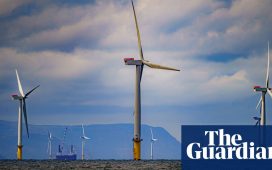The Danish company developing the world’s largest offshore windfarm in the North Sea is to cut hundreds of jobs and pause its dividend in an attempt to recover from a chaotic 12 months.
Ørsted, which is behind the £8bn Hornsea 3 project off the Yorkshire coast, said on Wednesday it planned to axe up to 800 jobs, pull back from markets in Spain, Portugal and Norway, and suspend dividend payments to shareholders covering the 2023-25 financial years.
The company said it would cut its target for developing renewable energy capacity by 2030, reducing it from 50 gigawatts to 35-38GW.
Its chair, Thomas Thune Andersen, will step down after almost a decade in the role, after the two senior executives who left the business in November.
The company, which is majority owned by the Danish government, said the “reset plan” was designed to make it a “leaner and more efficient company”.
Ørsted has struggled in the face of high inflation, supply-chain disruption and rising interest rates, which have hit the windfarm industry. The company has also experienced problems in the US in attempting to secure tax credits.
Last year, Ørsted cancelled two big offshore windfarm projects in the US, the Ocean Wind I and II schemes, blaming a sharp rise in costs. It took a 28.4bn Danish kroner (£3.3bn) hit as a result of the decision.
The company had also raised doubts over the cost of the Hornsea 3 project early last year. However, in December it reaffirmed its commitment to 2.9GW development, which is expected to supply power to 3.3m homes.
The RBC analyst Alexander Wheeler said financial markets had been expecting Ørsted to tap investors for funds, “which would have resolved the issues quicker and removed future risk in this regard”.
He added: “However, we now have a period where Ørsted needs to execute on various components of its plan to improve its balance sheet metrics over the medium term.”
Ørsted has 12 existing windfarms in the UK producing enough energy to power 6m UK homes. It is also working on a floating offshore wind project in Scotland.
Separately on Wednesday, the turbine maker Siemens Energy, which was forced to strike a €15bn (£12.8bn) rescue deal with the German government last year, reported a €1.58bn first-quarter profit after selling a stake in its Indian unit.
It said orders remained lower than forecast in its turbine division, where newer models have suffered technical faults, but it hoped to break even in that business in 2026.
after newsletter promotion
The problems affecting the windfarm industry caused the Swedish energy firm Vattenfall to stop work on the multibillion-pound Norfolk Boreas windfarm last year because it was no longer profitable.
The Norwegian oil and gas producer Equinor posted quarterly profits of $8.68bn – down from $17bn a year earlier but ahead of City forecasts – due to lower energy prices.
Meanwhile, the British Gas owner Centrica signed an agreement to buy a million metric tonnes of liquified natural gas (LNG) from Spain’s Repsol. The cargoes will be delivered to the Isle of Grain terminal in Kent between 2025 and 2027. Britain has a collection of gas terminals, providing fuel for domestic use and to be re-exported.
Germany has raced to bolster its ability to import shipped LNG since piped Russian gas supplies dropped after the invasion of Ukraine, while the US last month moved to curb gas exports by pausing all pending export permits amid climate concerns.
The new chief executive of BP said on Tuesday the oil and gas company would take a “more pragmatic” approach to reaching its green targets. Shell faced calls to speed up its investment in renewable energy last week, as it announced bumper profits and shareholder payouts and increased oil and gas production.
In January, gas-fired power stations provided the largest share of Great Britain’s electricity supply, at 35.7%, ahead of wind power at 33.5%, National Grid said this week.











